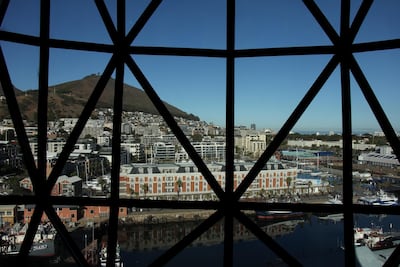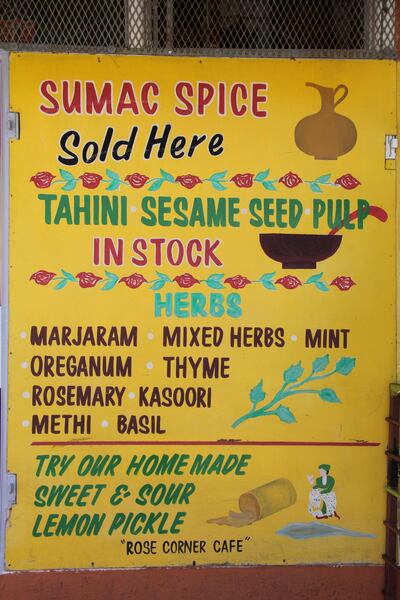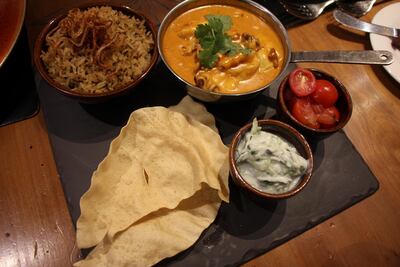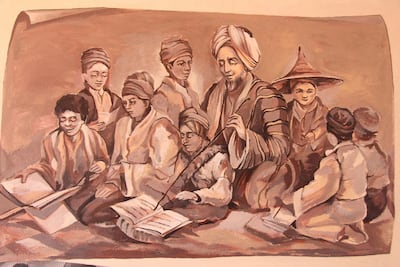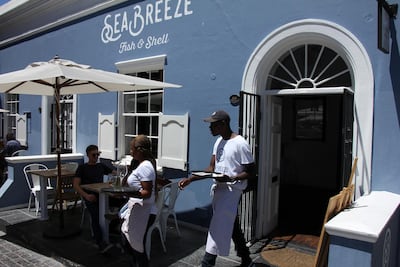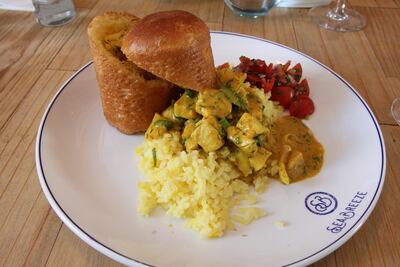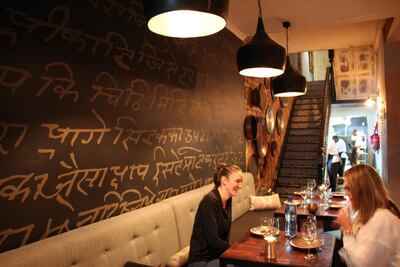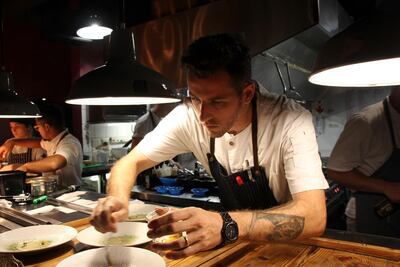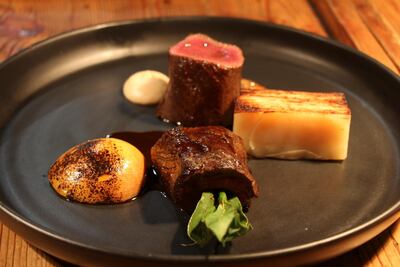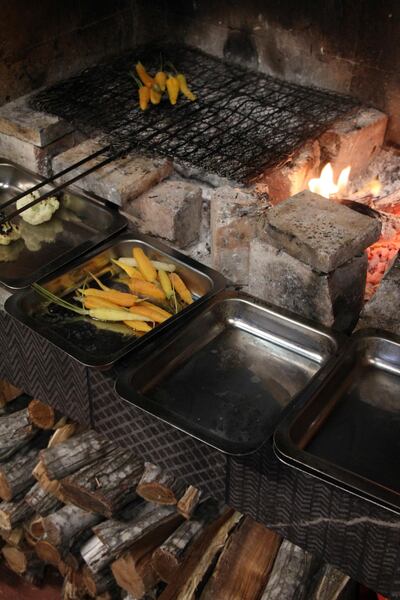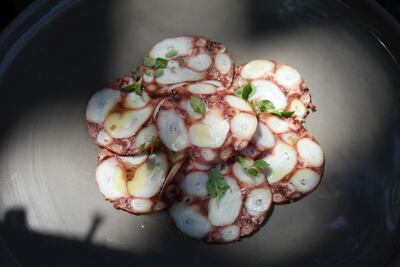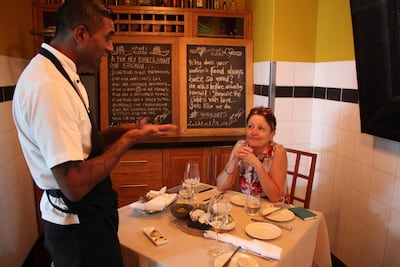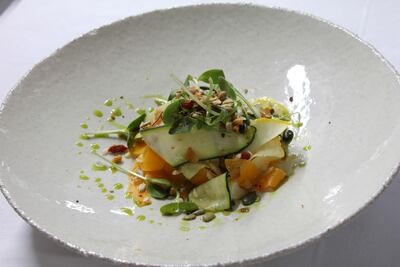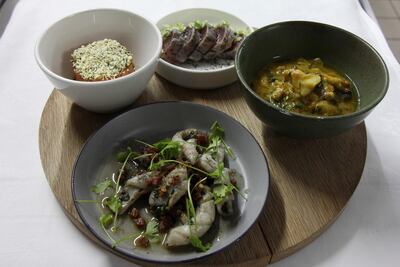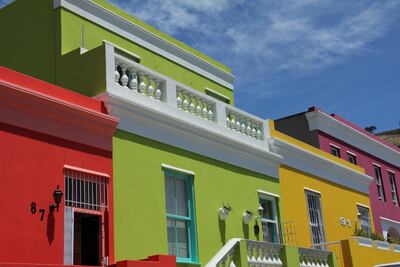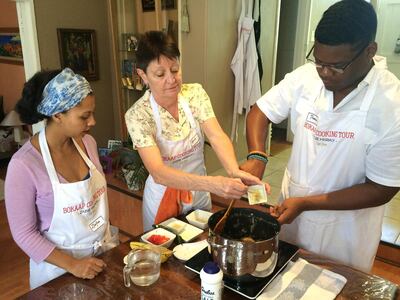The Cape Town dining scene is booming and everyone wants a reservation at Granary Cafe, signature restaurant of The Silo, the hottest hotel in Africa, which sits atop the city's spectacular new museum of African art. Both the museum and hotel are housed in what was once an immense concrete grain silo, which has marked the city's skyline since it was built in 1924.
I am seated at one of the dramatic window tables, mesmerised both by the sun setting over Table Mountain, and the choice of daring, modern dishes on the menu – ostrich tartare with buttermilk labneh, spicy apricot chutney and confit egg yolk; a vegan combination of roasted sweet potatoes, red quinoa, cranberries and kale pesto; line-caught Kingklip with pak choi, onion bhajis and fennel achar.
Food in Cape Town has always been what locals proudly call “lekker”, Afrikaans for tasty, using the country’s wonderful local produce in simple, delicious recipes. But today, chefs are a creating a new Cape identity with innovative menus, often inspired by spices and flavours of the city’s Muslim Cape Malay population and the flavours of African cooking.
To find out more about this new trend, I head to the elegant Signal Restaurant in the heart of the historic Victoria & Albert Waterfront to meet Malika Van Reenen, the pioneering chef who started this taste revolution. "Being Cape Malay myself," she explains, "and having grown up with the familiar flavours of sweet complementing savoury alongside freshly-ground spices, I always believed this style of cooking would become popular one day." Van Reenen perfectly combines classic European cooking techniques with her own upbringing, and tasting her butter curry risotto with grilled prawns or tender springbok fillet cooked with traditional Bobotie spices and sweet potato rosti, it is just surprising that chefs are only now discovering the unique heritage of the Cape Malays.
As with much of South African history, the story of the Cape Malays is steeped in controversy, dating back to the 17th century, when the first Muslims arrived in Cape Town, from what today is Indonesia and Malaysia, brought in as slaves by the Dutch colonial rulers. Apartheid determined their descendants were classified as “coloured”, and their Bo-Kaap neighbourhood was initially a ghetto. But times change, and Bo-Kaap is now one of the trendiest places to live, and the spices of Cape Malay cuisine have become the flavour of the day in restaurants all over the city.
Alex Grahame is one of numerous young, talented chefs from Europe and Australia arriving in Cape Town to make a name for themselves. His seafood restaurant Sea Breeze has been packed from the day it opened, perfectly located on Bree Street, the city's unofficial "restaurant row". "It was a big risk to leave our cosy restaurant in Aberdeen," he confides, "but in just a few months, we feel totally at home, and for a chef, the choice and freshness of local fish and seafood is overwhelming. We are committed to support the local fishing community, caught basically within 30 miles of here – so don't expect to see Norwegian salmon or Maine lobster on my menu."
Like all restaurants here, prices are exceptionally affordable, with a full tasting menu costing roughly the same as a main course in a gourmet European restaurant, where frankly, Grahame’s dishes would not look out of place. It is difficult to choose between seared tuna with charred cos lettuce, anchovies and quail egg, and the local favourite, fish bunny chow, a hollowed-out loaf of bread filled with creamy fish curry. Grahame tells me: “I certainly did not come here to cook British food, and living near the Bo-Kaap Cape Malay neighbourhood, I can get the most fabulous freshly-ground spices at an Aladdin’s Cave emporium called Atlas, which makes all the difference in my efforts to create a contemporary vision of traditional tastes.”
Garrulous Irish chef Liam Tomlin arrived here four years after a long gastronomic stint cooking in Australia, and is now running four of his own restaurants. His emblematic Chef's Warehouse is still the most popular diner in town, serving a compulsory seven-course tasting menu of Asian, Mexican and locally inspired tapas in a communal wooden table canteen, and I was intrigued to try his latest venture – the Indian-inspired Thali at 3 Park Road behind the City Centre area. Fearing the worst when I discovered there was no one of Indian origin cooking in the kitchen, the Thali turned out to be another Cape Town revelation. Tomlin's menu is an explosion of taste experiences, describing it as: "my personal interpretation of Indian cuisine, not from one particular region, but combining tandoori meat dishes from the North with vegetarian cooking from the South, plus a couple of molecular techniques to add some theatre."
Even on a Monday night, the place is buzzing with locals enthusiastically discovering eclectic dishes like a sublime beetroot-cured salmon with cucumber pickles, plump local oysters with a tangy lime leaf dressing, crunchy tandoori cauliflower and a rich smoked lamb shank curry.
Two young rock-and-roll South African chefs have opened exciting new venues recently too. Right in the centre of town, off the nightlife centre of Long Street, Shortmarket Club is a packed speakeasy, but the stellar dishes created at the frenetic open kitchen by Wesley Randles are Michelin-star standard. Randles collaborates with another chef-superstar, Luke Dale-Roberts, who shot to fame with The Test Kitchen, still the hardest restaurant in Cape Town to get a reservation for, but he has been given a free hand by Dale-Roberts here at the Shortmarket.
I breathe a sigh of relief that the usual marathon tasting menu is not obligatory, and as Wesley goes through the menu, he insists that, “we may be in the middle of a huge urban city, but within an hour, I can source sustainable seafood from the Indian and Atlantic oceans, organic vegetables and herbs, locally raised beef, lamb and our distinctive African game.” Difficult to resist specialities include juicy lamb chops from the Karoo desert with porcini marmalade or wild kudu grilled on bay leaves with smoked bone marrow and nectarine jus. And there is an epic selection of South African cheeses that would impress even a French fromagerie.
At Janse & Co, Arno Janse van Rensburg and his patisserie chef wife, Liezl, have just opened their first restaurant, and the atmosphere in the kitchen resembles an experimental laboratory. There is a stack of logs stoking a wood-fired grill which he uses for fish, meat and vegetables, replicating the smoky flavours of a traditional African "braai" barbecue, and Arno adds: "I try to create a unique taste to my dishes by making my own spices by homemade fermentation, smoking and drying."
His menu is certainly surprising, not just for the unexpected flavours, but also aesthetically, with some plates resembling artworks, like a mosaic of thinly-sliced octopus with strawberry and mint, smoked trout paired with plums and grapes, and the vegetarian goats cheese, apple, shiso and blueberry.
Janse & Co is on Kloof Street, not far from Cape Town's grandest hotel, the Belmond Mount Nelson, a legendary pink palace that is still the ultimate rendezvous for travellers and Capetonians. I am delighted to discover that instead of sitting down in their formal restaurant, there is a much more unorthodox experience awaiting foodies at Chef's Table. Rudi Liedenberg has been running the Mount Nelson's kitchens for several years, but is clearly part of the new revolution in Cape cooking as the cuisine of his Chef's Table follows the same trends I have tasted all over the city.
As if cooking on a seafood braai, he serves charred calamari with chorizo and garlic followed by coal-seared tuna with a miso aioli dip. Local oysters are topped with an explosive fermented lime achar, while the Jacopever fish, found only off South Africa’s coast, is pickled escabeche-style in tart Cape Malay spices. And what makes this meal unforgettable is that Liedenberg gives his guests full run of the kitchen, encouraging us to wander around and peer over his assistants’ shoulders while they prepare the dishes.
The chef, like most other chefs in the city, says the recent water crisis, in which the city of Cape Town was recently threatened with having to ration water to 25 litres per person per day, says that while thankfully the water crisis is over for now, his restaurant is playing its part in terms of not wasting it. “The most important issue in the kitchen is that whatever the state of the water crisis, we always need to prioritise hygiene – to sanitise and work hygienically. And that must never be sacrificed.
"But we have instituted a number of measures that will continue until the situation returns to normal, even if there will not be a Day Zero of turning off the water. To begin with, we have switched off half our ice machines to conserve where we can and use less ice where we can. Our habits have changed, to be a lot more conscious in our use and application. Water used for cooking is done in multiple layers, using the same pot with water for multiple applications. We try not to run free water down the drain, especially in rinsing, and now rinse in basins instead.
“Water used in the application of washing vegetables and lettuce is used afterwards to wash the floors. And if a crisis situation occurs again, we have put contingency plans in place at the hotel, as we use grey water in toilet systems, gardening and laundry,” he explains.
After tasting all the enticing spices at Mount Nelson, the perfect ending to a Cape Town trip is a tour of Bo-Kaap itself, the brightly-coloured houses and mosques of the Cape Malay people, with a hands-on morning cooking course in the home of pioneering chef Zainie Misbach, who has been teaching people how to cook samosas, masalas and creamy chicken curry for thirty years.
And while sitting in Auntie Zainie’s kitchen, enjoying the dishes that everyone helped prepare is certainly by no means fine-dining, this is the perfect foodie experience to shed light on why modern-day chefs are inspired by these traditional recipes.
IF YOU GO
The flights
Emirates and South African Airways fly direct from Dubai to Cape Town from Dh3,200 return, including taxes. The flight takes 9 hours. Etihad flies from Abu Dhabi with a stop in Johannesburg.
The hotel
At the luxury end, double rooms at the Cape Grace hotel cost from Dh2,754 per night, including breakfast. Alternatively, The Silo, atop the new MOCAA african arts museum, costs over Dh3,500 per night. For something more affordable, La Rose, a b&b in the heart of the Bo-Kaap Cape Malay Quarter, is in a brightly painted traditional house, friendly family, and very eco- aware - rooms cost about Dh200 a night.
The restaurants
Granary Cafe
Silo Hotel, V&A Waterfront: 0027 21 670 0500
Main course SAR200 (Dh60)
Signal Restaurant
West Quay Road, V&A Waterfront, 0027 21 410 7100
Main course SAR250 (Dh80)
Sea Breeze
213 Bree Street, 0027 74 793 9349
Main course SAR180 (Dh55)
Thali
3 Park Road, 0027 21 286 2110
Eight course tasting menu SAR700 (Dh215)
The Shortmarket Club
88 Shortmarket Street, 0027 21 447 2874
Main course SAR270 (Dh85), Seven course tasting menu SAR790 (Dh245)
Janse & Co
75 Kloof Street, 0027 21 422 0384
Three Course menu SAR385 (Dh120)
The Chef’s Table at Mount Nelson
76 Orange Street, 0027 21 483 1000
Three Course menu SAR545 (Dh170)
Bo-Kaap Cooking School
46 Rose Street, 0027 74 130 8124
Three hour Bo-Kaap walking your, cooking lesson and mean SAR825 (Dh250)
____________
Read more:
An Ultratravel guide to Cape Town, South Africa
A Michelin-starred tour of Hong Kong's best restaurants
____________

